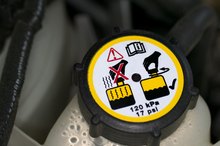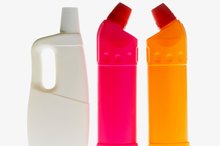What Are the Dangers of Paint Thinner?
Paint thinner is a common household item that comes in handy during paint jobs to thin down sticky paint or to clean dirty brushes 2. However, it is also a highly toxic substance that contains many chemicals harmful to the human body. Too much contact with paint thinner can cause allergic or respiratory problems. This substance should always be handled with care.
Dangers
Paint thinner contains chemicals that are hazardous to human health. The substance toluene can cause headaches, nausea and depression if inhaled while turpentine can cause confusion, respiratory distress and irritate the skin. Ethyl acetate irritates the eyes, nose and throat when inhaled and also has anesthetic qualities. Meanwhile, mineral spirits, which are often used in place of turpentine is also an irritant affecting the skin, eyes and respiratory system. Long-term exposure to some of the these substances can increase a person's chances of developing pneumonia or chronic kidney inflammation. Many of these elements are also highly flammable, which means they pose hazard in the workplace.
- Paint thinner contains chemicals that are hazardous to human health.
- Meanwhile, mineral spirits, which are often used in place of turpentine is also an irritant affecting the skin, eyes and respiratory system.
Children
What Are the Dangers of Inhalation of Oil Based Paint Primer?
Learn More
According to the National Capital Poison Center, paint thinner is categorized as one of the most common household substances that can cause harm to children. Children can easily choke on the substance if they try to swallow it, and any liquid that is swallowed may enter the lungs instead of the stomach, which could cause serious respiratory issues in a child, making breathing difficult and causing lung inflammation. Paint thinner is also categorized as a hydrocarbon, one of the leading causes of death in children by poisoning.
Used as Inhalant
The Office of National Drug Control Policy considers paint thinners among home products that are often used as inhalants. Some people sniff or huff (breathe in through the mouth) chemicals like paint thinners to create a psychoactive, mind-altering effect, which is also very damaging to human health. Immediate effects can include:
- mood swings
- violent behavior
- headaches
- abdominal pain
- muscle weakness
- numbness
- hearing loss
- fatigue
- lack of coordination
Long-term effects include heart failure and death, sometimes after just one use. According to the National Institute on Drug Abuse, some abusers began using inhalants as young as elementary school 1.
- The Office of National Drug Control Policy considers paint thinners among home products that are often used as inhalants.
- Some people sniff or huff (breathe in through the mouth) chemicals like paint thinners to create a psychoactive, mind-altering effect, which is also very damaging to human health.
Safety and Disposal
The Effects of Breathing Antifreeze Fumes
Learn More
Paint thinners should always be kept out of children's reach and stored in a well-ventilated area far away from anything that could ignite it. When handling paint thinners, keep on a face mask and wear gloves. Old paint thinner can be stored for reuse later or given away to someone who needs it 2. Unwanted paint thinner should never be poured down the drain as this can result in toxins leaking into the environment and contaminating groundwater. Instead, it should be handled as hazardous household waste according to local law. Contact your local environmental authority to find out how best to dispose of the chemical.
- Paint thinners should always be kept out of children's reach and stored in a well-ventilated area far away from anything that could ignite it.
- Unwanted paint thinner should never be poured down the drain as this can result in toxins leaking into the environment and contaminating groundwater.
Related Articles
References
Writer Bio
Chrys Lin has been working professionally in journalism since 2003. Her work has appeared in publications in the United States and parts of Asia. She currently resides in Texas and holds a Bachelor of Arts in print journalism.









